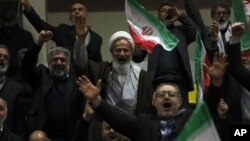Iran elects a new parliament on Friday in a vote that will test the popularity of the country's hardline clerical rulers, with mounting public dissent over economic woes and restrictions on political and social freedoms set to keep many Iranians at home.
With heavyweight moderates and conservatives staying out of the race and reformists calling it an "unfree and unfair election," the vote will pit hardliners and low-key conservatives against one another, all proclaiming loyalty to Iran's Islamic revolutionary ideals.
The vote will be the first formal measure of public opinion after anti-government protests in 2022-23 spiraled into some of the worst political turmoil since the 1979 Islamic Revolution.
Iran's top authority, Supreme Leader Ayatollah Ali Khamenei, has called voting a religious duty. He accused the country's "enemies" — a term he normally uses for the United States and Israel — of trying to create despair among Iranian voters.
But the clerical rulers' hopes for a high turnout and a boost to their legitimacy may be disappointed, as official polls suggest only about 41% of Iranians will vote Friday.
"I'm seeking a change in regime, and I've decided not to vote as it would only serve to reinforce the Islamic Republic's hold," said university student Mehran, 22, in the central city of Isfahan. "I want to live freely."
Tehran housewife Zahra, 26, said she would vote because "the world will understand that we support our leader (Khamenei). He said voting is our duty."
The Interior Ministry said 15,200 candidates will run for the 290-seat parliament, which has scant impact on Iran's foreign policy and nuclear dispute with the West, since these are determined by Khamenei.
Many pro-reform Iranians still have painful memories of the handling of nationwide unrest sparked by the death in custody of a young Iranian-Kurdish woman in 2022, which was quelled by a violent state crackdown involving mass detentions and even executions.
Economic hardships pose another challenge. Many analysts say that large numbers of Iranians no longer think Iran's ruling clerics are capable of resolving an economic crisis driven by a mix of U.S. sanctions, mismanagement and corruption.
While establishment supporters will likely vote for hardline candidates, widespread public anger at worsening living standards and pervasive graft may keep many Iranians at home.
Iranian activists and opposition groups are distributing the Twitter hashtags #VOTENoVote widely on social media, arguing that a high turnout will legitimize the Islamic Republic.
The parliamentary election is twinned with a vote for the 88-seat Assembly of Experts, an influential body that has the task of choosing the 84-year-old Khamenei's successor.





